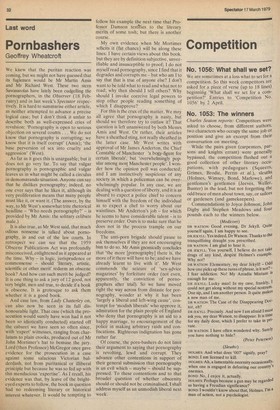Last word
Pornbashers
Geoffrey Wheatcroft
We knew that the puritan reaction was coming, but we might not have guessed that its fuglemen would be Mr Martin Amis and Mr Richard West. These two stern Savonarolas have lately been cudgelling the pornographers, in the Observer (18 February) and in last week's Spectator respectively. It is hard to summarise either article, as neither attempted to advance a precise logical case; but I don't think it unfair to describe both as well-expressed cries of revulsion: 'Pornography is open to serious objection on several counts . . . We do not know that pornography is corrupting; we know that it is itself corrupt' (Amis); 'the base perversion of sex into cruelty and aggression' (West).
As far as it goes this is unarguable; but it does not go very far. To say that vulgar pornography is pornographic and vulgar leaves us in what might be called a circulus in demonstrando situation. Anyone can say that he dislikes pornography; indeed, no one ever says that he likes it, although its very proliferation means that many people must like it, or want it. (The answer, by the way, to Mr West's somewhat trite rhetorical headline — 'Who needs pornography?' — is provided by Mr Amis: the solitary celibate male.) It is also true, as Mr West said, that much odious nonsense is talked about pornography, in and out of the law courts. In retrospect we can see that the 1959 Obscene Publications Act was profoundly misconceived. enlightened as it appeared at the time. Why — in logic, jurisprudence or commonsense — should 'literary, artistic, scientific or other merit' redeem an obscene book? And how can such merit be judged? It is one thing to ask a jury of 12 good, not very bright, men and true, to decide if a book is obscene. It is grotesque to ask them whether it is a good book.
And case law, from Lady Chatterley on, can also now be seen in its full dishonourable light. That case (which the prosecution would surely have won had it not been so idiotically conducted) started off the cabaret we have seen so often since, with 'expert' witnesses, ranging from charlatans to plain crooks, produced out of Mr John Mortimer's hat to bemuse the jury. Lord (then Professor) McGregor once gave evidence for the prosecution in a case against some salacious Victorian balderdash, not from puritanical or illiberal principle but because he was so fed up with this mendacious 'expertise'. As I recall, his evidence was that, by leave of the brighteyed experts to follow, the book in question had no redeeming literary or historical interest whatever. It would be tempting to follow his example the next time that Professor Damson testifies to the literary merits of some tosh; but there is another course.
My own evidence when Mr Mortimer solicits it (fat chance) will be along these lines: I have certain views about this book. but they are by definition subjective, unverifiable and insusceptible to proof; I do not myself read pornography, since I find that it degrades and corrupts me — but who am Ito say that that is true of anyone else? I don't want to be told what to read and what not to read; why then should I tell others? Why should I invoke coercive legal powers to stop other people reading something of which I disapprove?
For this is the crux of the matter. We may all agree that pornography is nasty, but should we therefore try to outlaw it? That question is left unanswered by both Messrs Amis and West. Or rather, their articles have a sheathed sting, not really sheathed in the latter case. Mr West writes with approval of Mr James Anderton, the Chief Constable of Manchester 'a bogy-figure for certain liberals', but 'overwhelmingly popular among most Manchester people'. I wonder how the opinion poll was conducted; and I am instinctively suspicious of any society in which a policeman can be overwhelmingly popular. In any case, we are dealing with a question of liberty, and it is as absurd to expect a police chief to concern himself with the freedom of the individual as to expect a chef to worry about our waistlines. Mr Anderton's job — for which he seems to have considerable talent — is to preserve order. Ours is to make sure that he does not in the process trample on our freedoms.
The anti-porn brigade should pause to ask themselves if they are not encouraging him to do so. Mr Amis gnomically concludes that 'the more [pornography] there is, the more of it there will have to be; and we have already learnt to live with it'. Mr West commends the seizure of 'sex-advice magazines' by forfeiture order (not even, apparently, the conviction of pornographers after trial). So we have moved right the way across from distaste for pornography, wonder at why it has been 'largely a liberal and left-wing cause', contempt for 'modish liberals' who approve it, admiration for the plain people of England who deny that pornography is an aid to a happy marriage, to encouragement of the police in making arbitrary raids and confiscations. Righteous indignation has gone rather far.
Of course, the porn-bashers do not limit their argument to saying that pornography is revolting, lewd and corrupt. They advance other contentions in support of their general submission that pornography is an evil which — maybe — should be suppressed. To these contentions and to that broader question of whether obscenity should or should not be criminalised, I shall address myself as an unmodish liberal next week.








 Previous page
Previous page